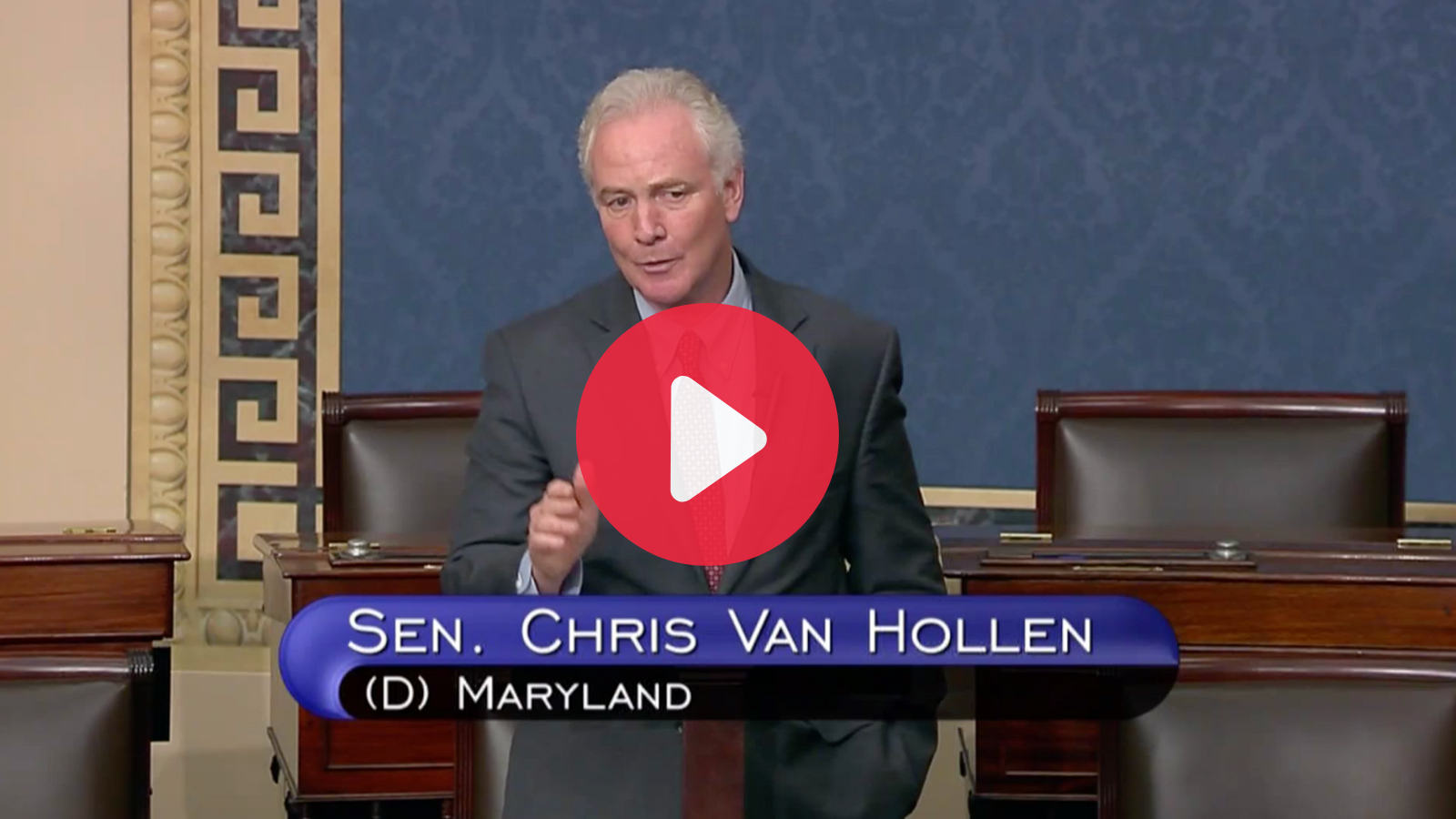Van Hollen Provisions Pass Senate in Bipartisan Bill to Enhance American Competitiveness in Technology, Innovation
Senator Van Hollen delivers a speech on the U.S. Senate floor on July 26 urging passage of the bipartisan competition package
Today, U.S. Senator Chris Van Hollen (D-Md.) voted to support Senate passage of the bipartisan competition package to boost American leadership in innovation and technology, including key provisions the Senator worked to secure. The CHIPS and Science Act invests in American semiconductor manufacturing, research and development, and emerging technologies and will lower costs for Americans, create good-paying jobs domestically, strengthen our country’s national and economic security, improve our supply chains, and enable us to remain competitive with China and other foreign powers. Senator Van Hollen authored several provisions in this legislation, including numerous wins for Maryland that boost the research capacity of Maryland Historically Black Colleges and Universities (HBCUs) and ensure we’re investing in the emerging, critical areas of science and technology of the future.
“When it comes to technology, standing still means falling behind. This bipartisan bill will help bolster American innovation and sharpen our global competitive edge while spurring U.S. manufacturing, lowering costs for consumers, securing critical supply chains, and growing jobs in Maryland and across the country,” said Senator Van Hollen. “I was proud to author a number of measures within this package – including one to establish a mechanism to ensure the United States develops a national strategy to invest in the key technologies of the future and another to ensure we put all our brainpower to work by expanding research capacity at Maryland HBCUs. I urge our House colleagues to pass this critical legislation to strengthen our economy and drive our nation forward.”
Yesterday, the Senator spoke on the floor of the U.S. Senate in support of this critical legislation. Watch his remarks here.
The CHIPS and Science Act includes provisions Senator Van Hollen fought for:
- Boost research capabilities and investment at our HBCUs. This bill includes language to help boost HBCUs to “very high research activity status.” Also known as “R1” status, this designation would provide both more opportunities to students and make these universities competitive among the highest caliber of research universities for more federal funding. This bill also directs the National Science and Technology Council to develop a report on the challenges and barriers to federal research and development awards for high research activity status (R2) HBCUs and recommendations to improve access. The CHIPS and Science Act authorizes $200 million in fiscal year 2023 and $250 million for each of the following four fiscal years to support research capacity-building efforts at HBCUs and other Minority Serving Institutions.
- Maryland is home to two R2 HBCUs: Morgan State University and University of Maryland Eastern Shore. There are currently 146 R1-designated institutions of higher education, but no HBCUs with an R1 designation.
- Grow investment in emerging technology research and development. The CHIPS and Science Act includes language from the Senator’s bipartisan National SEAL Act, which will help ensure U.S. leadership in discovery and innovation and strengthen the United States’ competitive edge against China and across the global economy. The provision directs the National Science Foundation Director to contract with the National Academies of Sciences, Engineering, and Medicine to identify critical, emerging areas of technology and assess U.S. federal investments and global leadership in those areas.
- Boost funding for federal research agencies and domestic manufacturing initiatives, including Maryland-based NIST. The bill boosts funding authorization for the National Institute of Standards of Technology (NIST) from $1.551 billion in FY23 to $2.283 billion in FY27, up from $1.23 billion in FY22. This includes:
- $275.3 million in FY23 to $550 million in FY27 for the Manufacturing Extension Partnership, a program to improve production process at small and medium-sized manufacturers; up from $158 million in FY22
- $97.05 million in FY23 to $250 million in FY27 for Manufacturing USA, a public-private partnership of 16 manufacturing innovation institutes focused on technology and innovation; up from $16.5 million in FY22
- $979.1 million in FY23 to $1.283 billion in FY27 for the Scientific and Technical Research and Service (STRS); up from $850 million in FY22
- $200 million per FY23-FY27 for Safety, Capacity, Maintenance, and Major Repairs at NIST facilities; up from $80 million in FY22.
- NIST’s headquarters is in Gaithersburg, MD
The CHIPS and Science Act also includes provisions from the following bills cosponsored by Senator Van Hollen:
- Supporting Early Career Researchers Act – establishes a 2-year pilot program to award grants to highly qualified early-career investigators to carry out independent research programs at institutions of higher education (IHEs). The CHIPS and Science Act authorizes this program to be funded at $250 million for the next two fiscal years.
- Combatting Sexual Harassment in Science Act – awards grants to IHEs and nonprofit organizations, through the National Science Foundation Director, to expand research efforts to better understand the factors contributing to and consequences of sexual harassment across the STEM workforce and research enterprise and to examine best practices to reduce its frequency and impact. NSF is also required to convene a working group of Federal statistical agencies to collect national data on the prevalence, nature, and implications of sexual harassment, enter into an agreement with the Academies to update the Academies’ research conduct report to include more detailed data points, and develop policy guidelines for Federal science agencies with a coordinated effort of an interagency working group chaired by the Director of the Office of Science and Technology Policy. The CHIPS and Science Act authorizes this grant program to be funded at $32.5 million.
A summary of the overall legislation can be viewed here.
